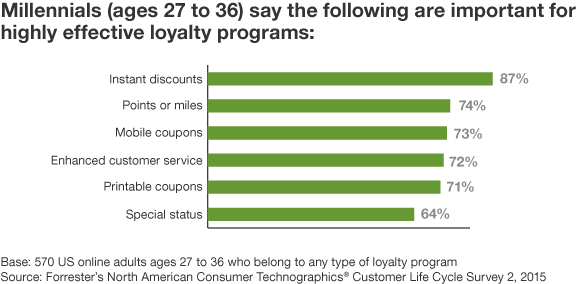The Data Digest: What Millennials Need From Your Loyalty Program
If you follow my blog regularly, you already know that I love to travel. And while I’ve had my fair share of travel hiccups (missed flight connections, last-minute assignments to the dreaded middle seat, lost luggage – you name it), I’ve always glossed over these snafus and accepted the fact that traveling inevitably comes with a few small challenges.
Until this year, when I hit executive traveler status on a major airline thanks to the loyalty points I amassed during my trips. Suddenly, my tolerable travel experiences became overwhelmingly enjoyable ones, and I quickly came to love (a word I don’t use loosely!) flying with this airline because of the VIP treatment. My reaction isn’t unique. In fact, it’s characteristic of my generation: Forrester’s Consumer Technographics® data shows that Millennials highly value loyalty programs that reward customers with enhanced customer service and special status, as Millennials cherish this sense of validation and exclusivity.

Specifically, our data shows that the loyalty program reward tactics that work for middle-aged and older consumers are not enough to satisfy Millennials. While customers of every generation want discounts, Millennials also expect loyalty programs to offer a premium customer experience. And what’s more, younger consumers want the flexibility of applying loyalty points to a variety of benefits – from travel upgrades to digital media content to charitable donations – while their older counterparts are happy using their points to get cash back.
This research means that in order for marketers to win and retain the rising number of Millennial rewards members, they must account for generational nuances in loyalty program attitudes and expectations. I explore these nuances more deeply in my recent report, a collaboration with my colleague Emily Collins. We argue that: “The mechanics of a loyalty program are transactional, but the results are emotional. The most profitable loyalty programs move beyond rewards points to deliver value to the customer and foster love for the brand.” By understanding how perceptions of value differ by age group, marketers can optimize their loyalty programs to build emotional loyalty among a generation that is notoriously hard to retain.
